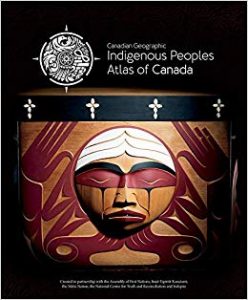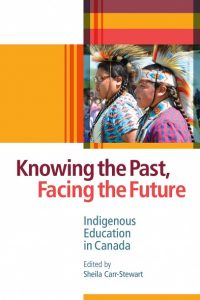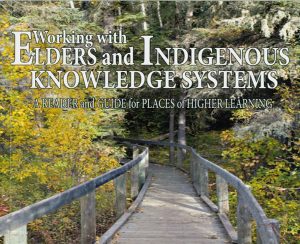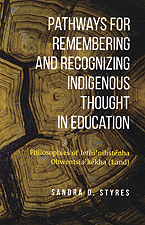In December of 2019, the Yellowhead Institute released a report, “Calls To Action Accountability: A Status Update On Reconciliation”, bringing attention to the fact that only 9 of 94 Calls to Action listed by the Truth and Reconciliation Commission of Canada have been completed. To start a new year and a new decade off right, the OISE Library is here to support those beginning a journey of understanding Indigenous issues. This month’s Indigenous display explores the history of Indigenous peoples in Canada, examines the Truth and Reconciliation Commission, and draws out contemporary issues and concerns, especially related to education. Our featured titles explore ways in which all people, Indigenous and Settler, can forge better relationships and work together towards decolonizing Canada so that more Calls to Action can be completed.
 To begin this learning journey, one needs to understand the history of the Indigenous peoples of Canada. A good starting place may be the Indigenous Peoples Atlas of Canada volumes 1-4, available in hard copy and as a web resource. These volumes were created by the Royal Canadian Geographical Society in partnership with the Assembly of First Nations, Inuit Tapiriit Kanatami, the Métis Nation, the National Centre for Truth and Reconciliation, and Indspire. They provide essential historical and cultural information, maps, illustrations, and explorations of Truth and Reconciliation. To further this understanding of Canada’s Indigenous history and the
To begin this learning journey, one needs to understand the history of the Indigenous peoples of Canada. A good starting place may be the Indigenous Peoples Atlas of Canada volumes 1-4, available in hard copy and as a web resource. These volumes were created by the Royal Canadian Geographical Society in partnership with the Assembly of First Nations, Inuit Tapiriit Kanatami, the Métis Nation, the National Centre for Truth and Reconciliation, and Indspire. They provide essential historical and cultural information, maps, illustrations, and explorations of Truth and Reconciliation. To further this understanding of Canada’s Indigenous history and the  Truth and Reconciliation Commission, research can be extended with Knowing the Past, Facing the Future: Indigenous Education in Canada edited by Sheila Carr-Stewart. Very recently published in 2019, this ebook traces the history of colonial practices and school systems in Canada, explores the continuing impact of historic racism and trauma, and dives into current issues in education, addressed from both Indigenous and Western perspectives.
Truth and Reconciliation Commission, research can be extended with Knowing the Past, Facing the Future: Indigenous Education in Canada edited by Sheila Carr-Stewart. Very recently published in 2019, this ebook traces the history of colonial practices and school systems in Canada, explores the continuing impact of historic racism and trauma, and dives into current issues in education, addressed from both Indigenous and Western perspectives.
Current issues facing Indigenous populations are further examined in Indigenous Nationhood: Empowering Grassroots Citizens, a collection of the best blog posts written by Mi’kmaq lawyer, activist, and academic Pamela Palmater. Palmater investigates political and social concerns related to Canada’s Indigenous population and encourages grassroots movements among individuals in Indigenous communities while petitioning for the improvement of relations between such individuals and their larger communities, local governments, and Nations.
 In education especially, forging relationships between Indigenous and Settler populations and perspectives is crucial to reconciliation and the creation of holistic and inclusive learning environments. Working with elders is one way that this can be achieved. Working with Elders and Indigenous Knowledge Systems: A Reader and Guide for Places of Higher Learning by Herman Jeremiah Mitchell provides “a starting base from which [readers] can develop their own ways of working with Elders,” and attempts to bridge the gaps between Indigenous and Western understandings.
In education especially, forging relationships between Indigenous and Settler populations and perspectives is crucial to reconciliation and the creation of holistic and inclusive learning environments. Working with elders is one way that this can be achieved. Working with Elders and Indigenous Knowledge Systems: A Reader and Guide for Places of Higher Learning by Herman Jeremiah Mitchell provides “a starting base from which [readers] can develop their own ways of working with Elders,” and attempts to bridge the gaps between Indigenous and Western understandings.
 The OISE Library has a number of useful resources for incorporating Indigenous perspectives in the classroom. These include Pathways for Remembering and Recognizing Indigenous Thought in Education: Philosophies of Iethi’nihsténha Ohwentsia’kékha (Land) by OISE’s own Sandra D. Styres, focusing on Indigenous ways of knowing and forging relationships between them and the discipline of education, Integrating Aboriginal Perspectives into the School Curriculum: Purposes, Possibilities and Challenges by teacher-training instructor at the University of Manitoba Yatta Kanu, and, for direct classroom use by students, the Circle of Life: Learning from an Elder classroom sets of levelled books for grades K-2 created by the Indigenous Education Coalition, among others.
The OISE Library has a number of useful resources for incorporating Indigenous perspectives in the classroom. These include Pathways for Remembering and Recognizing Indigenous Thought in Education: Philosophies of Iethi’nihsténha Ohwentsia’kékha (Land) by OISE’s own Sandra D. Styres, focusing on Indigenous ways of knowing and forging relationships between them and the discipline of education, Integrating Aboriginal Perspectives into the School Curriculum: Purposes, Possibilities and Challenges by teacher-training instructor at the University of Manitoba Yatta Kanu, and, for direct classroom use by students, the Circle of Life: Learning from an Elder classroom sets of levelled books for grades K-2 created by the Indigenous Education Coalition, among others.
These books and more related titles can be found on display on the ground floor of the OISE Library.
For additional learning and teaching support on this journey to understanding, be sure to also check out the Infusing Indigenous Perspectives in K-12 Teaching research guide and OISE’s Deepening Knowledge Project online.
